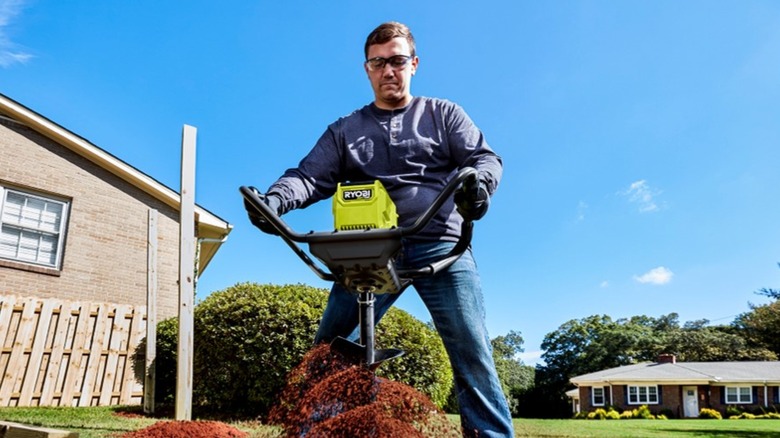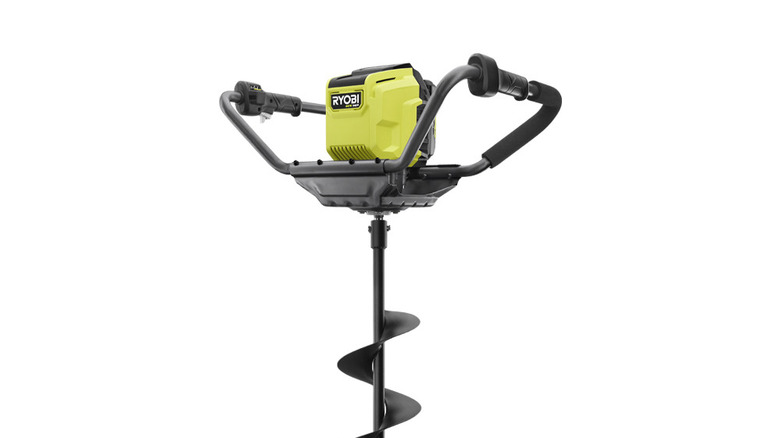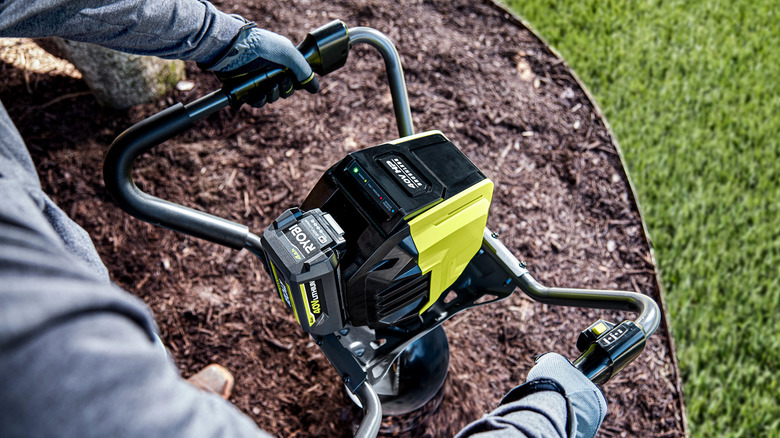Ryobi Ice Vs. Earth Auger: What Are The Differences?
At some point, anyone who has ever tried to maintain or develop their property will run into the inevitable need to dig some holes. Whether it's adding a new fence to your backyard or making way to plant some additional foliage, the act of digging holes can quickly go from a casual activity to a hardcore workout. Thankfully, tools like augers exist to keep the back pain at bay and they can mean the difference between a few hours or a few days of landscaping work. These days, leading power tool manufacturers like Ryobi have recognized the need to make the act of digging holes a little more efficient and have released several auger models, such as the Ryobi Ice Auger and Ryobi Earth Auger.
Despite being made for different things, both auger models are part of the Ryobi 40V battery system, which uses high performance lithium batteries. In addition, they are designed to be powerful while remaining portable and easy to hold. Depending on how hard you need to go, both models also offer two speed modes, as well as the option to reverse. Not to mention, they also have added safety features, such as anti-kickback mechanisms, to reduce your risk of injury from accidents. Lastly, they're both backed by the same 3-year battery warranty and 5-year warranty periods.
So, how do you know which one is for you? Before we can understand how they set themselves apart, it's important to know how each model is supposed to function.
What's the difference between the two Ryobi augers?
Retailing for $449, the Ryobi Ice Auger is designed to drill through blocks of ice for things like ice fishing or sampling. To be able to do this, it needs to be rotated at high speeds and equipped with an ice bit at the end. Unsurprisingly, according to Ryobi, its Ice Auger can rotate as fast as 200 revolutions per minute (rpm) and can accommodate bit sizes that range from 4" to 10". Although it is pretty lightweight at only 34 lbs, the Ryobi Ice Auger can generate up to 54 ft. lbs. engine torque.
On the other hand, the Ryobi Earth Auger is designed to drill holes through soil for things like sampling, planting, or fencing. A great Ryobi tool for landscapers, it's meant to tackle a different set of challenges, which include rocks and roots. Joining our list of the most expensive Ryobi power tools for sale, the Earth Auger itself only costs $369, but you'll need to shell out an extra $60 if you don't own the battery and charger yet. Unlike its Ice counterpart, the Earth Auger has a motor torque of 1.9 ft. lbs. and it's also significantly heavier at 40.2 lbs. That said, straight out of the box, one reviewer mentioned that they were able to successfully dig more than two dozen holes with one full battery. Under the right settings, Ryobi claims it can drill up to 30 holes with a single charge.
Which Ryobi auger should you get?
In reality, it would be possible to use both augers interchangeably for many small scale residential tasks. In fact, many reviewers for both models have mentioned using them for tasks that the other model would have been better suited for. For example, one reviewer mentioned using the ice auger to dig holes and cut through cedar roots when building a fence. On the other hand, another reviewer mentioned that they bought the earth auger with the intention of using it for ice during winter as well (and they were pretty satisfied with its performance). However, it is still ideal that you purchase the one that fits your specific need, so it's built to withstand the right conditions.
It is important to note that the ideal auger for your needs may actually be neither of these options. Apart from ice and earth augers, Ryobi offers more variants that range from a handheld version, best for gardeners, to those designed for use by professional plumbers, like the 18V Drain Auger. Lastly, before you buy your first Ryobi auger, you should definitely check out our run down on everything you need to know before buying, so you don't waste money buying a battery system you already own or attempt to buy from a retailer that doesn't carry them.


